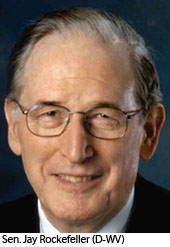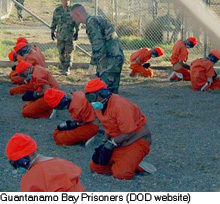We've been trying to find the original source for that mysterious meme about China drilling for oil off the coast of Cuba and Florida.
It's flat out wrong. The AP debunked it a few days ago after Vice President Dick Cheney tried to pass it off in remarks to the U.S. Chamber of Commerce about high energy prices.
But it lives on. GOP operative Mary Matalin repeated it on CNN just last night.
We've traced the evolution of the non-fact and found it emerged a few months ago with an inexplicable spate of letters to the editor at small and regional daily newspapers. Within weeks it was popping up as a talking point among many Republican lawmakers and getting traction from conservative pundits.
In most instances, the Republicans point to the (fake) story as reason to suspend the current moratoriums on offshore drilling that are largely based on environmental concerns. It may also serve to gin up opposition to the Cuban regime, a sentiment that has been vital to GOP support in Florida.
It is true that Sinopec, the Chinese oil company, along with a half dozen other foreign firms, signed an agreement with the Cuban government to possibly explore for drilling opportunities offshore. The Sinopec deal was forged back in 2005, and any actual drilling has been delayed until at least 2009.
A 1977 agreement between Cuba and the United States set the maritime boundary at the halfway mark along the 90-mile stretch from Key West to the Cuban coast. Cuban drilling about 50 miles off the coast of Florida could begin next year.
Cheney said he got the misinformation from a George Will column published on June 5.
By then, it was already a common talking point for GOP lawmakers. Also on June 5, Rep. Jean Schmidt (R-OH) spoke on the House floor and said: "The Chinese are drilling off the coast of Florida with their new energy partner, Cuba."
On May 23, David Gay, a Republican Congressional candidate from New York, said: "I think it is appalling that we allow Cuba and China to drill in the Florida Straits, meanwhile forbidding our own selves from seeking the common good, in this case, a way to lower the price of gasoline."
No doubt the notion was helped along by Weekly Standard writer Fred Barnes, who cited it unsourced in a column widely distributed by Yahoo.
A few weeks before that, our old friend Sen. Larry Craig (R-ID) cited the alleged Chinese drilling in a May 1 press release.
Our Nexis search also found a reference to Chinese drilling from Rep. Thelma Drake (R-VA) in an April 12 op-ed in the Daily Press of Newport news.
It was in late March that the whole thing initially picked up steam. As though on cue, letter-to-the-editor writers nationwide began complaining about China's alleged drilling in the Gulf and fired off missives to their local papers.
On March 29. Jerry Lightsey in Texas wrote the Austin American-Statesmen, saying:
"China is drilling offshore from Cuba in waters where we should be."
Then a few days later on April 2 a man named Don Code of Reno wrote the Reno
Gazette-Journal.
"As I write this letter, China is drilling oil in our own back yard, in the Gulf of Mexico for Cuba. They are drilling in the exact same spots we would be drilling in, but the tree huggers won't let us."
On April 6, from the letters to the editor page of the St Louis
Post-Dispatch, Edward Wolfe of Kirkwood, who described himself as a retired physician, wrote:
"China is drilling off the coast of Cuba only 90 miles from the U.S., some of it being done laterally into our ocean spaces."
April 8 Letter to the editor to the
Leaf-Chronicle in Clarksville, Tenn. Jim Weague wrote:
"We cannot drill in the Gulf of Mexico, although China and Cuba are drilling there right now."
Before late March, we could find only trace evidence of this story, in obscure places online like this one here. What triggered this sudden, widespread and misinformed outrage? Was there some sort of email blast that went out?
Maybe the March 17 news story from McClathy planted the seed. The story didn't say that China was drilling, but it raised the spector:
HAVANA, Cuba -- Imagine oil rigs drilling in deep waters just 45 miles off the coast of South Florida. Refineries process the oil in Cuba and sell it across the Caribbean and beyond. Canadian and Mexican companies supply billions of dollars in equipment and services.
This could happen, as Havana invites foreign companies to explore its probable oil and natural-gas reserves while Washington's embargo against the communist-led island keeps U.S. companies locked out.
South Florida is watching closely, amid debate over drilling near its shores and concerns about U.S. energy policy. Oil companies increasingly seek to tap Cuba's deep-water reserves, now that oil prices are soaring and profits are more likely.
But all those letters all at once seems like an awful big coincidence.















 Why Didn't DOJ Name Cheney in Stevens Filing?
Why Didn't DOJ Name Cheney in Stevens Filing? Searching For The True Source Of A Bogus Story
Searching For The True Source Of A Bogus Story Plame Renews Suit against Rove, Cheney, and Libby
Plame Renews Suit against Rove, Cheney, and Libby Ex-Archives Security Chief: Cheney Self-Exemption 'Remarkable'
Ex-Archives Security Chief: Cheney Self-Exemption 'Remarkable'


